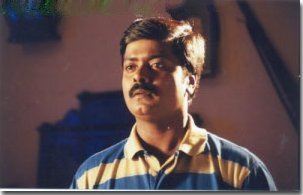The Director's intention is good for he wanted to establish a good
principle. But he has not chosen a good story to bank upon.
What he wants to drive home is this. It is not a crime on the part
of the parents if they leave away some property to their
offspring. But they should not create problems of their own
children. Of Course this makes a fine point of view. But the
director has failed to establish his viewpoint in categorical
terms as the story he had woven around this thread lacks in
strength. The mountain has been shattered but the rat has escaped.
But the film is able to hold its head high on two grounds. The
first one is the beauty of Pradhiksha. The other one is the
occasional brilliance of Vadivelu's comedy. Moreover the movie
does not lack in commercial values.
Napoleon, in his drunken state of mind, had molested the
life-partner of Nasser before the latter marries her. Nasser, in
his outrage works an evil machination. He asks his nephew, Murali,
to love Pradiksha, the daughter of Napoleon. As things would have
it, the youngsters fall actually in love. When the wedding is
fixed he conceives a plot to stop the celebration, in order to
settle an old score with Napoleon. But Murali remains patient and
hopeful. What his uncle says is Veda for him. Yet he manages to
change the mind of his uncle. Having undergone a change of heart,
Nasser, at last, unites Murali and Pradhiksha together.
Nasser nurses a grudge and harbours hatred in his heart for
Napoleon, even after the latter had sought pardon for his crime.
We are able to see the obstinacy of the director itself reflected
in the stubbornness of Nasser. The death of Napolean and Sithara
in the eventual scene is quite unwarranted.
The two some of Murali and Vadivelu comes to the rescue of the
film more than the pair of Murali and Pradiksha. Murali cannot be
blamed for he has fulfilled the task given to him. Through and
through the film, Nasser continues to be an angry old man whereas
Napolean remains cool as a cucumber. Lacking in quality, his
make-up has let him down.
Heroine Pradiksha is the big plus point of the movie. Though she
does not dazzle as an actress, she gives us a ray of hope that she
will have a say in Tamil films for some time. She has promise and
potential, to say the least. Anjali Tanikar fails to impress. What
for she is there in the picture, one is tempted to think.
Vadivelu makes us laugh no doubt. But his sound jars our ears most
of the time. A voice beckons him from a distance. This sends down
a chill in his spine, developing cold feet he blabbers this and
that and runs here and there. How long will he continue to antics
like these?
Deva never exerts himself for the sake of small budget films. He
remains true to himself in this film too. Routine, commonplace
music.
All of a sudden, Pradiksha falls in love with Murali, Nasser's
atrocious audacity and adamancy and Murali's double talk [While he
speaks to Nasser in favour of Napoleon, he talks to the people in
an attacking manner about Napoleon] are serious shortcomings.
Their drawbacks deter us from enjoying the picture to the full
extent. When all is said and done, Thambi Ramayya, the director
can be congratulated openly for one reason. This is his debut
film. He has put in his sincere labour. He has scored at least a
small success in pinpointing a meaningful.
The picture has a weighty theme, but a weak story built on it.
The scenes in which Murali and Vadivelu run out of fear for the
general public as they go to see the bride.
Climax scenes fall by the wayside.
| Waauv..... |
Buss..... |
| The
scenes in which Murali and Vadivelu run out of fear for
the general public as they go to see the bride. |
Climax
scenes fall by the wayside. |
|
|
